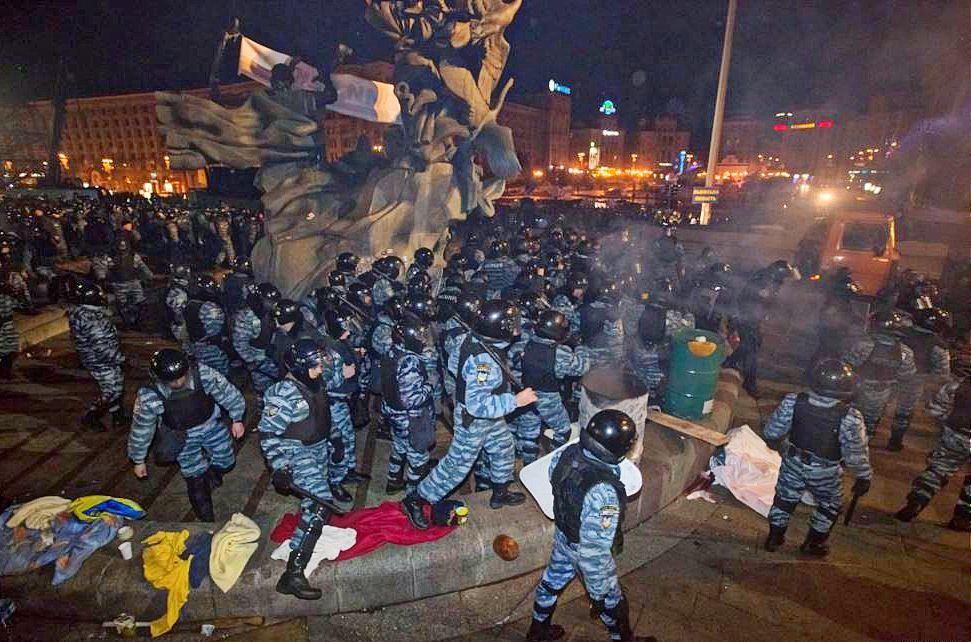
First Blood of EuroMaidan. "They stomped on us, beat and finished us with batons"
Three years have passed since the night of a bloody crackdown on the Maidan protesters by Berkut riot police. And while the former president - a traitor and a fugitive - claims he can’t remember the events of three years ago, dozens of victims are still waiting for justice, a fair sentence for those who were beating the activists with batons during a peaceful protest.
The early hours of November 30, 2013. The tenth day of the Euromaidan started. It was a protest against the refusal of the then-government to sign off the Ukraine-EU Association Agreement. Some protesters did not amuse themselves with any illusions regarding the actual possibilities to make the authorities reconsider their move, but people still continued to come to the Maidan. Activist Ilya Krotenko, at that time a student of the National Pedagogical Institute, was just one of them.
Despite the fact that the opposition politicians actively spread information that a so-called farewell Viche [assembly] was about to be held, the young man went to the Maidan every day and almost every night, where he helped out with some organizational issues. The activist recalled that the last major rally (according to the plans of the opposition) was to be held on December 1. "There we would have heard statements like: ‘Friends, we have fought, but we have failed to break the existing system’," he said.
Krotenko is convinced that after this, the Maidan crowd would have just gone home. But crackdown with a violent beating of activists has made such a scenario impossible. At the beginning of "cleansing", several hundred protesters remained at the Maidan and, contrary to a popular belief, there were not just students.
That night, Ilya Krotenko was not present at the Maidan. Upon hearing the morning news, the activist realized that everything would not just pass easily. And he was right – the Revolution started with the dawn of the day.
Commandant
Vadim Vasylchuk was one of the Maidan commandants, whose task was to coordinate people. He said reports of a possible crackdown had been spun from the very first day of protests as clashes between protesters and police occurred regularly. In particular, police would not allow protesters to put up tents or other shelter from rain. However, before the night of a crackdown, these clashes were no more than a light tussle.
Late Friday, November 29, was just another evening for the protesters. The only new thing was that they started to dismantle speakers and other equipment due to the preliminary agreement with opposition politicians that on Sunday they would provide their own equipment.
Vasylchuk made a round check, talked to people and explained that no one should go home because the rally was supposed to continue the next day, so the stage and equipment would still be there. He moved up Institutska Street, where he saw busses heading down to the Maidan. Through a curtain in one of them the commandant noticed a man wearing a riot police helmet. Realizing that there would be a crackdown, he ran to warn the people. "We had pre- planned, what we should do if they tried to disperse us: we were to gather up near the monument, clench our hands together and hide the girls inside the circle. So we have done all this very quickly," says Vasylchuk.
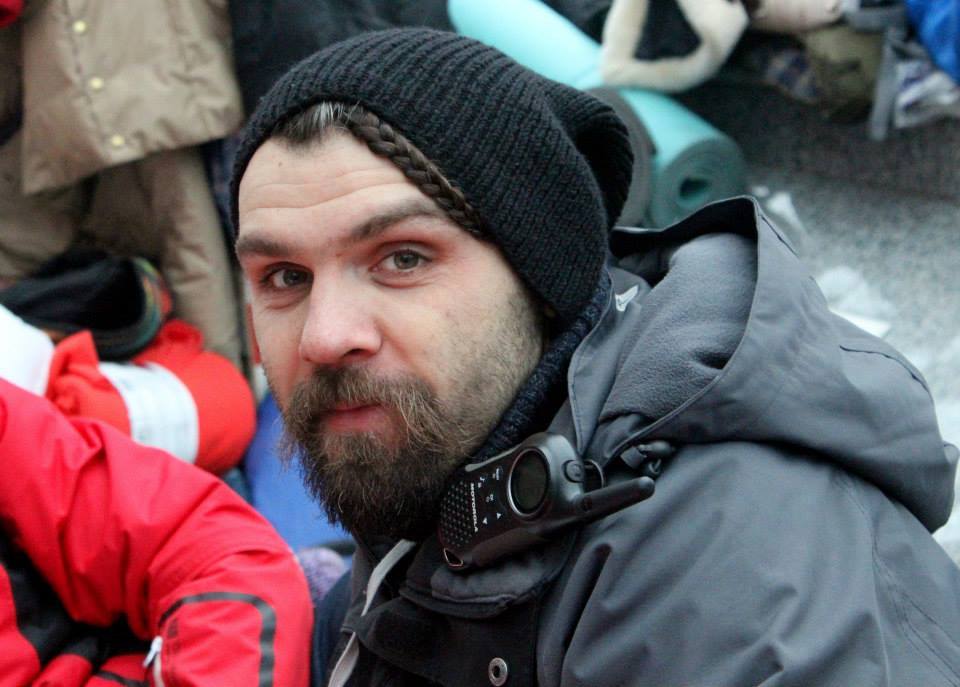
Berkut was approaching from several directions. The Euromaidan activists held hands tightly and tried to hold their ground. At first it seemed that the security forces simply pushed them back, but it took less than a minute for everyone to become clear that an actual beating started. People were falling to the ground and just could not stand back up, and there are dozens of videos uploaded on YouTube confirming this.
"They stomped on us, beat and finished us with batons. Then they started yelling and swearing at us, calling for us to get up," said the commandant.
Later, the security forces would lie shamelessly that they had been provoked by the protesters and allegedly just pushed the activists back without using any anti-riot devices.
After the first beating at the Independence monument, security forces formed a "corridor", as if allowing activists to exit from this infernal circle at the Maidan, but in fact they actually just slammed on the protesters once again. They hit them in the head, in the kidneys, in the legs. Vasylchuk says that during those moments, he caught most blows.
Fleeing from Berkut riot police, protesters came upon the internal troops of the Interior Ministry. "I have no idea what orders they had but it was evident that they did not fully understand what was happening. After we started to run out, they did nothing. This saved us," Vadym says.
At the same time, in his opinion, Berkut must have had clear orders to detain activists – riot police officers pursued their victims in different directions - people fled to St. Michael's Cathedral, Dnipro Hotel, and Bessarabka market. "At this critical moment, there were no politicians beside us, on whom we partly relied in our protests. That is why we had a very clear sense that we had been given up on,” he said.
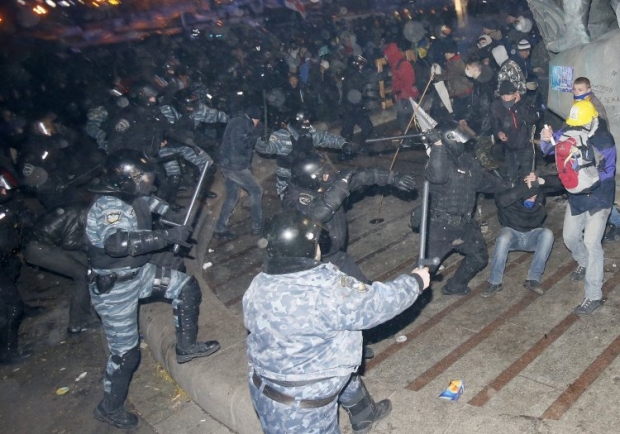
Vadym Vasylchuk managed to escape from his pursuers and immediately began writing about the crackdown to other coordinators: "Save the people, let’s gather outside the St Michael’s Cathedral..."
Student-historian
Vitaly Kuzmenko is one of the victims of Berkut beatings. The young man suffered an arm fracture and a head injury. The early hours of November 30 2013 was the first night at the Euromaidan for the student-historian of a Kyiv University named after Borys Hrinchenko. When security forces surrounded the Independence monument, Vitaly was on its stairs. “Berkut began to move forward, and several people in front of me fell under their blows. A moment later, Berkut were in front of me, showering blows, and at some point I was pulled out from the crowd, overpowered, and continuingly beaten," says the young man.
Several officers beat him with batons and kicked him. After the beating, Vitaliy was stuffed into a paddy wagon across Institutska Street, with nearly 30 of other people “detained” in a similar manner. Because the vehicle is not designed for such a number of people, we couldn’t even sit down. In that paddy, there was that one guy who realized that he could not move his hand. So he just tried to fix it with his own scarf…
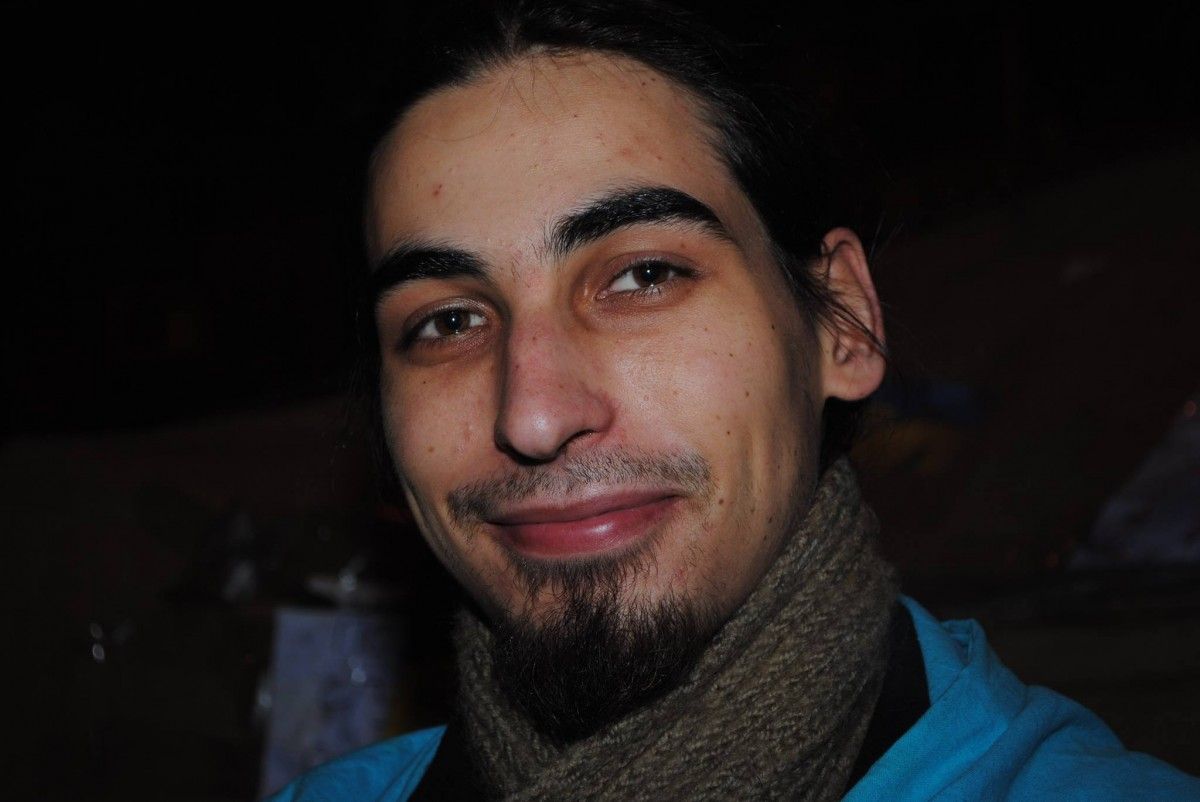
Protesters were brought into the Shevchenkivsky District Police Department but did not provide them with any first aid for up to two hours. ER teams were only allowed to the injured after the police questioned each of the protesters. "I recently went to the PGO, reviewed the case and saw that report. The main text was recorded from my words, but in the end, I completed the document with a written statement on the inadequate behavior of policemen during my detention. Although, I had no idea back then how this would all end," says Vitaly.
Then Kuzmenko was brought to the trauma center, and then admitted to a hospital. He stayed at the hospital up until December 11, and just a day after he was discharged he returned to the Maidan, with a cast on his hand. In summer of 2014, he volunteered to take part in the Anti-Terrorist Operation in eastern Ukraine. Until spring of 2016, he served in military recon battalions, mostly in the south, near Mariupol.
Lawyer
Natalia Mamalyha is a lawyer. Like most activists, she was drawn to the Maidan by a sharp turn in public policy and personal dislike of Yanukovych and his entourage. According to Natalia, there were less people that night than in the previous few days. It even seemed that the crowd would gradually disperse.
At approximately 4:00 she came out of the coffee shop, planning to go home, but first decided to check back to the Maidan.
Speaking with people, she suddenly heard someone saying that a Berkut squad was approaching from Instytutska Street. There was a call for women to stay inside the circle of men near the monument at the Maidan. "Everyone there thought this would all result in some light pushing. However, Berkut surrounded the monument from three sides, pushing inward, and the young women started crying. Somebody inside that makeshift "circle" offered to sing the anthem, which we did," says Natalia.
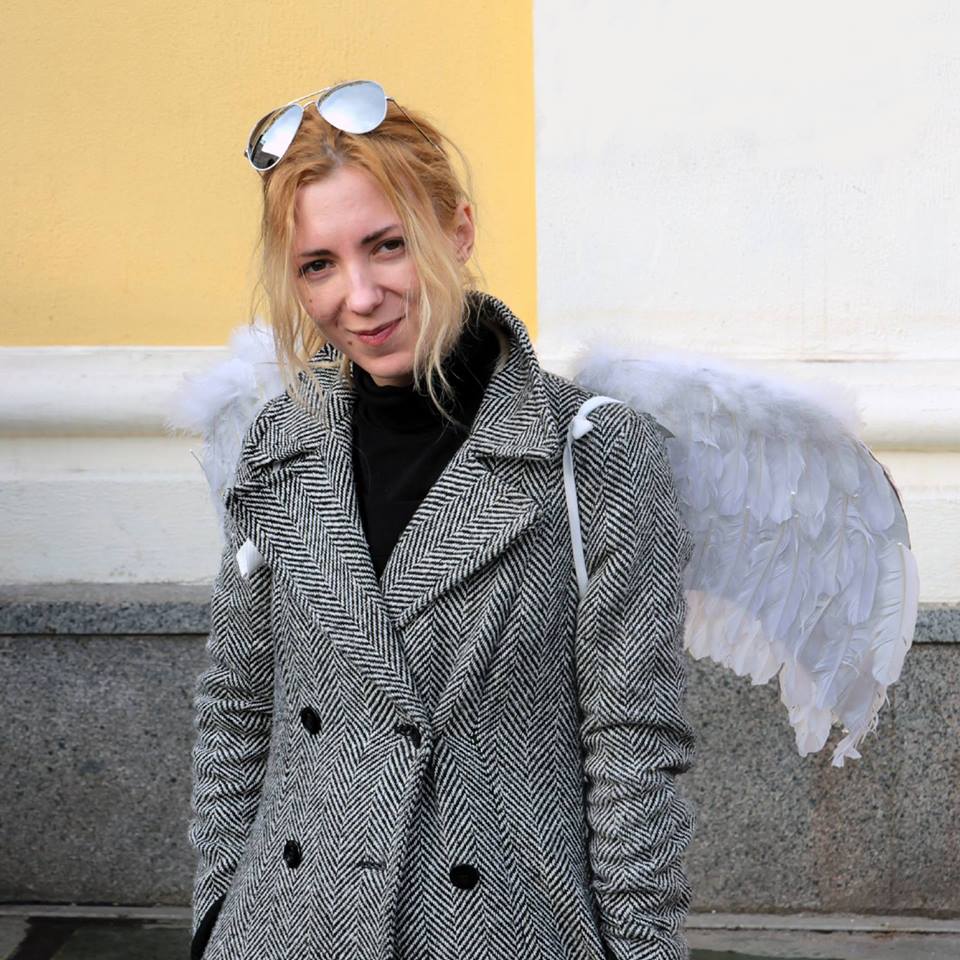
She said some guy helped her down from the monument, and she saw him being hit by a Berkut officer. "I don’t know whether the Berkut officer was aiming at me, but that guy’s blood was left on my coat," she adds.
Natalia was not hurt in a crackdown. Unharmed, the girl went to the main post office, and only then did she see a large number of injured people. She witnessed Berkut troops pulling an unconscious young into the paddy by his feet. Together with several young men, Natalya rushed toward the Bessarabian market. Meanwhile, on the other side of Khreschatyk, a Berkut team continued to beat with truncheons those they were able to catch up with. According to Mamalyha, Berkut halted their pursuit outside a Bessarabka market, and only then was the woman able to provide first aid to the victims, along with the other activists.
Photographer
For Yulia Kochetova-Nabozhnyak, who is a photographer working for various international agencies, the Maidan had started earlier in Lviv. It was there, on Liberty Avenue, near the Shevchenko monument, she saw a large mass of people singing the national anthem. "I was shocked. I was thinking back then that Kyiv would never see anything like that," she recalls.
But that very evening, Yulia sat on a train heading to Kyiv, meeting many students from Lviv. With thermo-mugs and banners, they were going to the Maidan, and it was then when Yulia started to realize that the history will be decided right there.
On the night of the November 30, Kochetova-Nabozhnyak came to the square after a late photo shoot. The atmosphere was quite usual – it was cold, but quiet and calm at the same time. In the middle of the night she went to the nearest cafe to warm up a bit, and at this moment the turmoil at the Maidan began. "I had this strange feeling that I should return back to the Maidan. Coming out of the cafe, I saw a handful of people, 50 at most, who were fleeing the scene, being beaten in the back. It seems there was only one TV cameraman who just yelled obscenities. The ground was littered with paper towels, drenched in blood, and I just couldn’t grasp what was happening," she recalls.
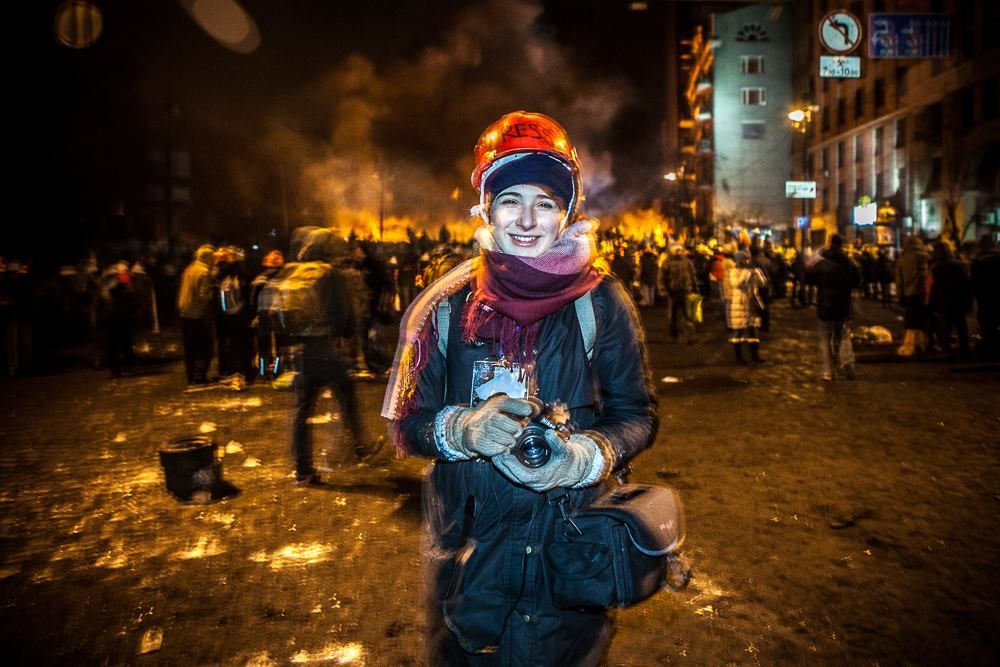
Overcoming own stupor, Yulia came close to the Berkut cordon and began shooting portraits of riot police. At that moment, the girl had no fear of a possible beating or at least a rational explanation why she was doing it. "There was only anger and helplessness. I knew that there was nothing I could do about it," she said.
In the morning, upon her return to the dorm where she lived at the time, Yulia finally let her tears flow...
***
Many activists among those who became victims of Berkut on the night of November 30 found refuge from the attackers in St. Michael Cathedral. Tose who were not seriously injured drafted an action plan in case of a possible attack of security forces because the bus with Berkut troops was circling around. The activists decided to go for a lockdown in the church. But there was no attempt to raid the monastery.
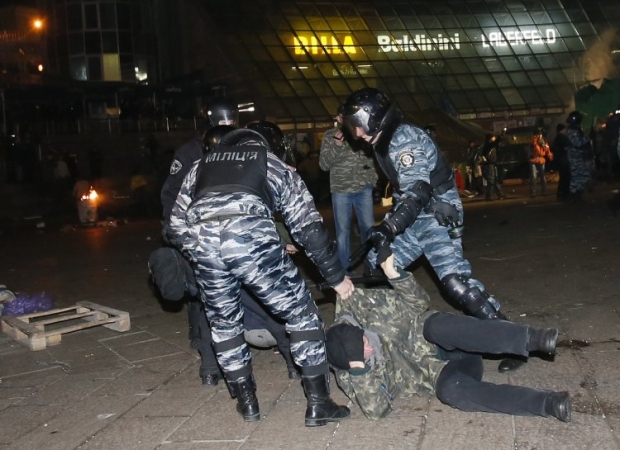
In the morning, having learned of the brutal crackdown of protesters, Kyiv residents started bringing to the St. Michael's Cathedral food, medicine, and blankets. It was then, on the morning of November 30, when most people realized that the Euromaidan would never be the same again. At that time, no one knew how many more crackdowns, "cleansing raids", beatings and even killings lay ahead.
Court hearings. In anticipation of verdicts
Two criminal cases have been heard in court for the second year into the brutal beating of peaceful protesters. The first one is on charges against former head of Kyiv City State Administration Oleksandr Popov, who, according to the PGO had conspired with former Deputy Secretary of the National Security Council Volodymyr Sivkovych and instructed the public utility services to install a Christmas tree at the Maidan Nezalezhnosti. The case file states that this fact allowed the then head of Kyiv police Valery Koryak to order the dispersal of a peaceful rally.
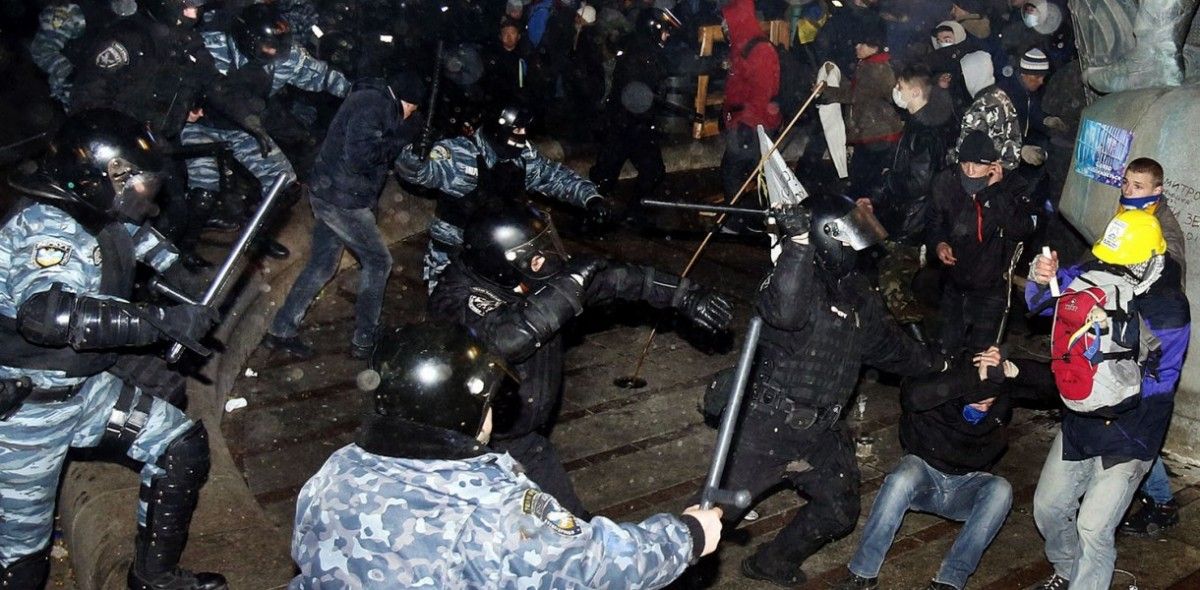
The second case regards four Berkut troops who participated in the dispersal - Dydyuk, Tyahnyryadno, Antonov, and Shevchenko. Both cases are still only at the stage of hearing testimony of victims.
Soon, yet another case into the dispersal should be forwarded to court, this one against a Berkut officer. Maryna Lilichenko, the lawyer who represents the victims, is convinced that it’s the judges who delay trial. "Our cases are heard by odious judges who should not be doing this,” she said.
Lawyers filed recusal motions against two judges, but they were overruled.
Victims also have questions to Prosecutor General Yuriy Lutsenko and current Interior Minister Arsen Avakov. In fact, according to Maryna Lilichenko, some troops involved in the beatings of protesters are still working on high positions in law enforcement.
In addition, the lawyer recalled that the representatives of the victims have certain problems with the evidence base. Indeed one of the defense’s key questions to the victims is: "Did you see that person in particular?"
As the faces of riot police officers were covered with helmets, the victims naturally respond that they have not seen them. "We know that there was a Kyiv unit of Berkut at the Maidan, as it was stipulated by an order. We saw Koryak, Kosyuk, Sadoviy there, and those four who are now in the dock. But the evidence is lacking that they were those who beat up the people. And this is the problem," Lilichenko says.
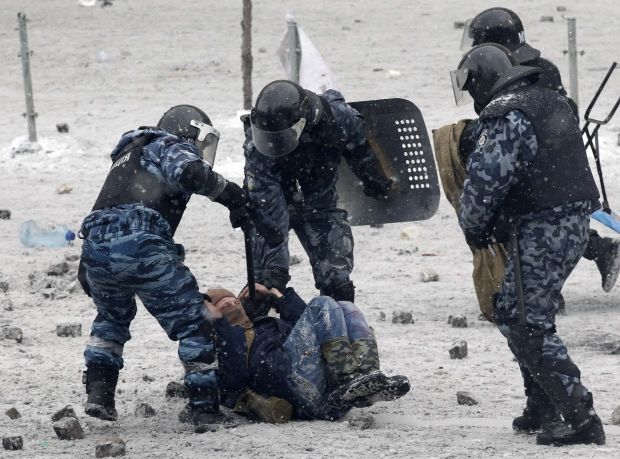
According to Vitaly Kuzmenko, the official number of victims of that terrible night amounts to 80 people. Three years ago, immediately after those events, the affected activists founded a public organization called "November 30". Today they are still in contact and try to accelerate the investigation. They are currently preparing relevant material to file with the authorities and demand justice.
The activists believe that it is not enough for the current government to just lament the Yanukovych regime that provoked the slaughter and feed the public a new portion of promises to punish those responsible ahead of another anniversary. Instead, the authorities should investigate more thoroughly the crimes committed three years ago.
Iryna Shevchenko

